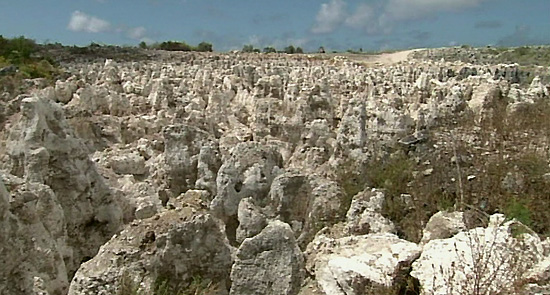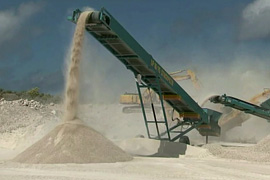Nauru hopes ride on second chance
Pacific island looks for fresh chance to revive squandered fortune.

 |
| Decades of phosphate mining have left Nauru’s landscape a lunar wasteland |
When phosphate was first discovered on Nauru a century ago it covered nearly 80 per cent of the island.
| Special series |
Now there is just a fraction left, as well as thousands of prehistoric coral pinnacles that the old mining equipment was unable to break.
The pinnacles are everywhere, creating a moonscape across much of the tiny South Pacific island.
Left in this condition there is simply no chance of crops or vegetables ever being produced. But now, after many years of talking, there is finally some action.
Heavy equipment has been brought in and set to work crushing lumps of coral that used to stand as pinnacles.
Phosphate mining once made Nauruans the second richest people in the world on a per capita basis.
But the wealth was squandered through corruption and mismanagement.
The country was virtually bankrupt eight years ago and economists say Nauru is a case study in how not to respond to the problems that can be caused by a resource boom.
Vinci Clodumar from the Nauru Rehabilitation Corporation says the plan is to clear the giant pinnacles from more than half the island and then dig another eight metres to mine it again.
 |
| Nauru plans to use the revenue to give the island a fresh start |
He says there could potentially be close to a billion dollars worth of secondary phosphate.
The plan is to use that money to finally rejuvenate the area with trees and crops.
“It’s only logical that we also try and extract residual phosphate,” he says, “so that we can earn revenue and continue to rehabilitate as much land that we can from the revenue that we earn.”
But there are many obstacles ahead, including convincing cautious landowners wary of the mistakes of the past.
“Trust is gone,” says landowner Doneke Kepae.
“That’s probably one of our biggest problems at the moment. We no longer trust the government, the people doing the mining. We’ve just lost all trust.”
The burden of fixing this has fallen on the shoulders of Marcus Stephen, Nauru‘s president and – as a four-time Olympic weightlifter – its most famous sportsman.
 |
| Nauru’s president believes the island can restore its fortunes |
“The future is very good for Nauru,” he told Al Jazeera. “It’s just a matter of doing it right this time.”
Nauru’s past leaders were responsible for some of the worst excesses, like using the national airline for personal shopping trips.
But the current president is one of the lowest paid world leaders – his wage is the same as every other government worker at about $150 per week.
He says there was a recent two month period when there was simply not enough money in the government’s coffers to pay salaries.
“You can imagine being a parent and just looking up and saying ‘what am I going to do to put food on the table?'”
He is hopeful the darkest days are now over and that the mining of Nauru’s secondary phosphate reserves will provide a second chance for the tiny nation to find lasting prosperity.
